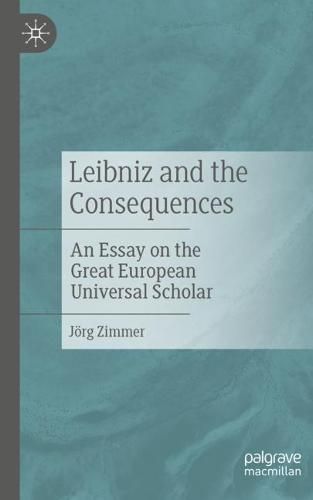Readings Newsletter
Become a Readings Member to make your shopping experience even easier.
Sign in or sign up for free!
You’re not far away from qualifying for FREE standard shipping within Australia
You’ve qualified for FREE standard shipping within Australia
The cart is loading…






This title is printed to order. This book may have been self-published. If so, we cannot guarantee the quality of the content. In the main most books will have gone through the editing process however some may not. We therefore suggest that you be aware of this before ordering this book. If in doubt check either the author or publisher’s details as we are unable to accept any returns unless they are faulty. Please contact us if you have any questions.
Leibniz was probably the last universal scholar in modern times who made original and innovative achievements in all the essential fields of knowledge of his time: as a reform-oriented lawyer, a multilateral thinking diplomat, as a mathematician of infinitesimal calculus, as the inventor of a calculating machine and in the mining of horizontal wind power, as an organizer of science and as one of the first historians who strived for source-critical methodical objectivity. However, this baroque diversity can only be understood from the center of a monadological philosophy, which wants to establish the unity of scientific worldview and metaphysical concept of the world. It is distorted in the classical reception because only Leibniz the Theodicy was known. The topicality of Leibniz today consists in re-exposing the original basic idea of unity in diversity and asking how it can be made fruitful for philosophical and political thought in the 21st century.
This book is a translation of the original German 1st edition Leibniz und die Folgen by Joerg Zimmer, published by J.B. Metzler, imprint of Springer-Verlag GmbH, part of Springer Nature in 2018. The translation was done with the help of artificial intelligence (machine translation by the service DeepL.com). A subsequent human revision was done primarily in terms of content, so that the book will read stylistically differently from a conventional translation. Springer Nature works continuously to further the development of tools for the production of books and on the related technologies to support the authors.
$9.00 standard shipping within Australia
FREE standard shipping within Australia for orders over $100.00
Express & International shipping calculated at checkout
This title is printed to order. This book may have been self-published. If so, we cannot guarantee the quality of the content. In the main most books will have gone through the editing process however some may not. We therefore suggest that you be aware of this before ordering this book. If in doubt check either the author or publisher’s details as we are unable to accept any returns unless they are faulty. Please contact us if you have any questions.
Leibniz was probably the last universal scholar in modern times who made original and innovative achievements in all the essential fields of knowledge of his time: as a reform-oriented lawyer, a multilateral thinking diplomat, as a mathematician of infinitesimal calculus, as the inventor of a calculating machine and in the mining of horizontal wind power, as an organizer of science and as one of the first historians who strived for source-critical methodical objectivity. However, this baroque diversity can only be understood from the center of a monadological philosophy, which wants to establish the unity of scientific worldview and metaphysical concept of the world. It is distorted in the classical reception because only Leibniz the Theodicy was known. The topicality of Leibniz today consists in re-exposing the original basic idea of unity in diversity and asking how it can be made fruitful for philosophical and political thought in the 21st century.
This book is a translation of the original German 1st edition Leibniz und die Folgen by Joerg Zimmer, published by J.B. Metzler, imprint of Springer-Verlag GmbH, part of Springer Nature in 2018. The translation was done with the help of artificial intelligence (machine translation by the service DeepL.com). A subsequent human revision was done primarily in terms of content, so that the book will read stylistically differently from a conventional translation. Springer Nature works continuously to further the development of tools for the production of books and on the related technologies to support the authors.